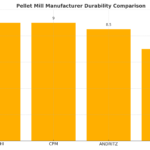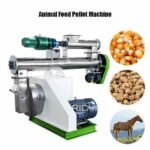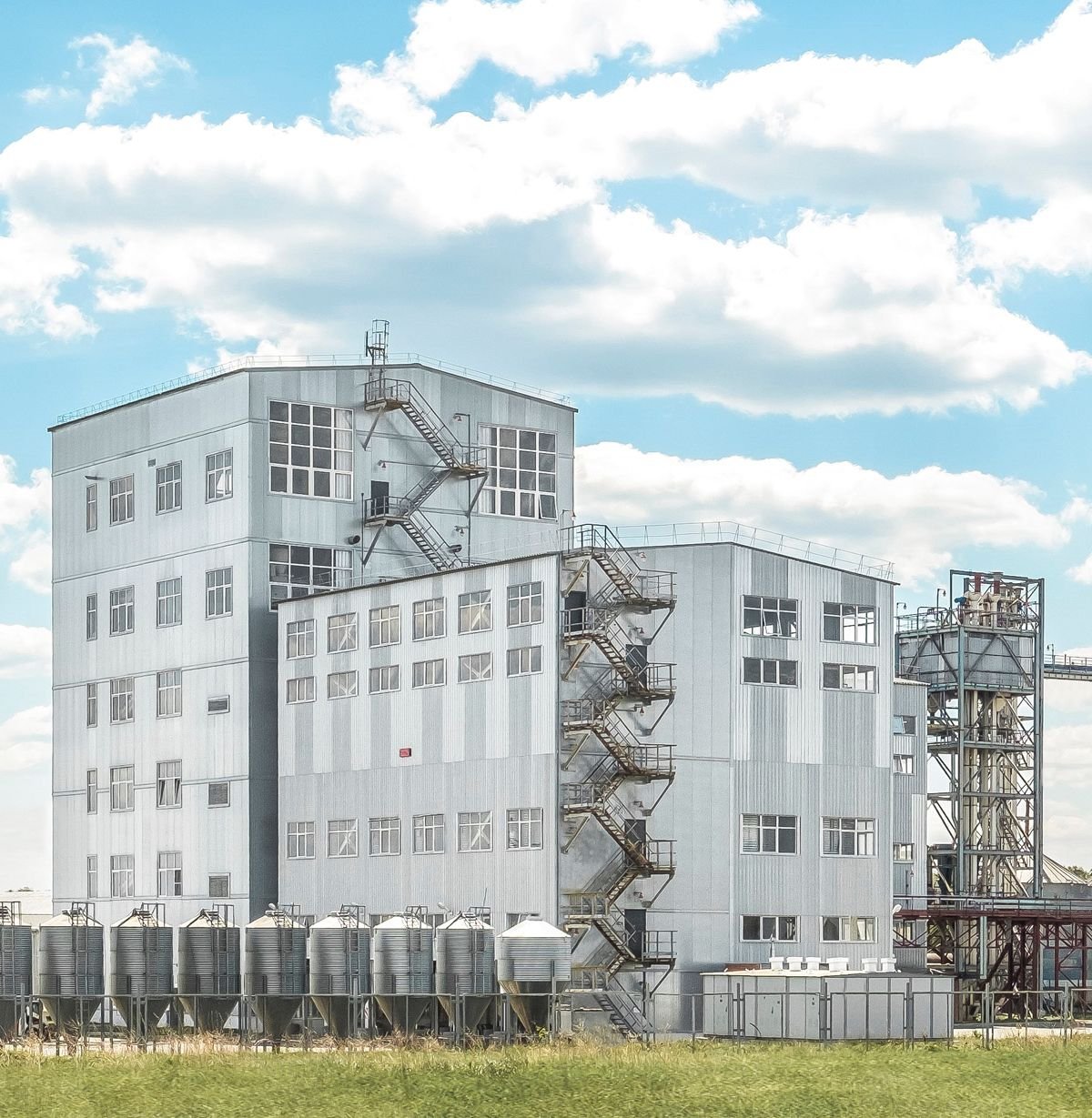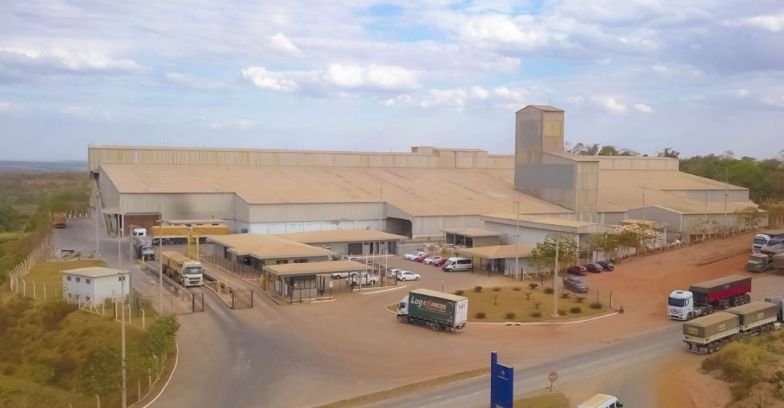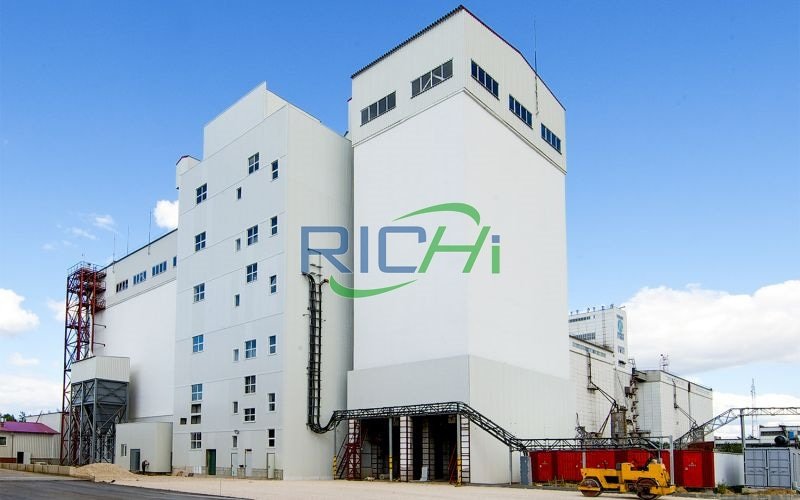Constructing a large-scale feed mill plant with a capacity of 60-80 tons per hour (t/h) is a significant undertaking that requires substantial investment in civil construction. The civil construction costs for such a project can vary widely depending on various factors, including location, local labor and material costs, site conditions, and specific design requirements. This article will explore the key components of civil construction for a feed mill plant and provide an estimate of the associated costs.
Key Components of Civil Construction for a Feed Mill Plant
- Site Preparation
The first step in constructing a feed mill plant is preparing the site. This involves:
- Land clearing and grading
- Soil testing and improvement if necessary
- Installation of drainage systems
- Access road construction
- Foundation Work
A solid foundation is crucial for supporting the heavy machinery and structures in a feed mill. This includes:
- Excavation for foundations
- Reinforced concrete foundations for main buildings and equipment
- Piling work if required due to soil conditions
- Main Building Structure
The main building of the feed mill typically includes:
- Steel frame or reinforced concrete structure
- Walls (often made of precast concrete panels or metal sheeting)
- Roofing
- Flooring (often with special requirements for load-bearing and durability)
- Auxiliary Buildings
Additional structures may include:
- Raw material storage facilities
- Finished product warehouses
- Office buildings
- Maintenance workshops
- Quality control laboratories
- Silos and Bins
Feed mills require various silos and bins for storing raw materials and finished products:
- Concrete or steel silos for bulk storage
- Smaller bins for ingredient storage
- Utility Infrastructure
Essential utilities must be installed, including:
- Electrical systems and substations
- Water supply and treatment facilities
- Wastewater management systems
- Fire protection systems
- Environmental Control Systems
Modern feed mills often require:
- Dust collection systems
- Ventilation and air conditioning systems
- Noise reduction measures
Related post: https://www.richipelletmachine.com/animal-feed-processing-plant/
Factors Influencing Civil Construction Costs
Several factors can significantly impact the civil construction costs of a feed mill plant:
- Location: Construction costs can vary greatly depending on the country and region. Urban areas typically have higher costs than rural locations.
- Local Labor and Material Costs: The availability and cost of skilled labor and construction materials in the area will affect overall costs.
- Site Conditions: Challenging terrain, poor soil conditions, or the need for extensive site preparation can increase costs.
- Design Complexity: More complex designs or specialized requirements will generally increase construction costs.
- Environmental Regulations: Compliance with local environmental regulations may require additional investments in pollution control and waste management systems.
- Scale and Capacity: While a 60-80t/h plant is already large, variations within this range can affect the size of buildings and foundations required.
- Automation Level: Highly automated plants may require more sophisticated building designs to accommodate advanced control systems.
Estimated Civil Construction Costs
Given the numerous variables involved, providing an exact cost for civil construction is challenging. However, we can offer a rough estimate based on industry standards and recent projects:For a 60-80t/h complete feed mill plant, the civil construction costs typically range from $5 million to $15 million USD.This estimate can be broken down as follows:
- Site Preparation: 5-10% of total civil construction cost
Estimated range: $250,000 – $1,500,000 - Foundation Work: 15-20% of total civil construction cost
Estimated range: $750,000 – $3,000,000 - Main Building Structure: 30-40% of total civil construction cost
Estimated range: $1,500,000 – $6,000,000 - Auxiliary Buildings: 10-15% of total civil construction cost
Estimated range: $500,000 – $2,250,000 - Silos and Bins: 15-20% of total civil construction cost
Estimated range: $750,000 – $3,000,000 - Utility Infrastructure: 10-15% of total civil construction cost
Estimated range: $500,000 – $2,250,000 - Environmental Control Systems: 5-10% of total civil construction cost
Estimated range: $250,000 – $1,500,000
It’s important to note that these figures are estimates and can vary significantly based on the factors mentioned earlier. For example, a feed mill plant built in a developed urban area with stringent environmental regulations might fall on the higher end of the cost spectrum, while a similar plant in a rural area with lower labor costs might be on the lower end.Additional Considerations
- Contingency Budget: It’s advisable to allocate an additional 10-15% of the total civil construction budget for contingencies to cover unexpected costs or changes during the construction process.
- Professional Fees: The costs for architectural and engineering services, project management, and construction supervision are typically not included in the civil construction costs and should be budgeted separately. These fees can range from 5-10% of the total construction cost.
- Equipment Foundations: While the foundations for buildings are included in the civil construction costs, specialized foundations for specific pieces of equipment might be considered part of the equipment installation cost rather than civil construction.
- Future Expansion: If future expansion is anticipated, it may be cost-effective to design and construct certain elements (like foundations or utility infrastructure) to accommodate future growth, even if it increases initial costs.
Conclusion
The civil construction cost for a 60-80t/h complete feed mill plant is a significant portion of the overall investment in such a facility. With estimated costs ranging from $5 million to $15 million USD, it represents a substantial commitment. However, this investment provides the essential infrastructure that will support the plant’s operations for decades to come.
Given the scale of investment and the long-term nature of the project, it’s crucial to work with experienced architects, engineers, and contractors who specialize in feed mill construction. Their expertise can help optimize the design for efficiency and future flexibility while ensuring compliance with all relevant regulations.
Potential investors and project managers should conduct thorough feasibility studies and obtain detailed quotes from multiple contractors to get a more accurate estimate for their specific project. By carefully planning and managing the civil construction phase, companies can create a solid foundation for a successful and efficient feed mill operation.



